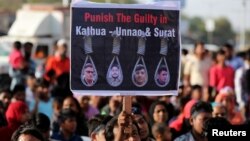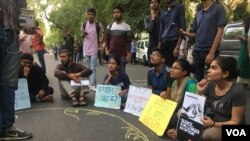When New Delhi-based lawyer Alakh Alok Srivastav filed a petition in the Supreme Court earlier this year asking for capital punishment for child rapists following the brutal gang rape of an eight-month old baby, the government lawyer argued "the death penalty is not the answer to everything."
Three months later, an outburst of national outrage over the gang rape and murder of an eight-year-old girl in Kashmir and the rape of a 16-year-old in Uttar Pradesh, prompted a change in the government's stance.
The government has approved the death penalty for rape of children below 12 years of age and increased minimum jail terms from 10 to 20 years for the rape of a girl below 16 and from seven to 10 years for older women.Suspects can be tried using the emergency measure for the next six months but it must eventually be approved by parliament to become law.
Many enraged citizens have called it a step in the right direction. "It is an extremely welcome decision. When the rapist comes to know that the death penalty is there, then a majority of criminals will be actually deterred," asserts Srivastav.
But many lawyers and child rights activists warn that instead of acting as a deterrent, capital punishment for child rapists will simply drive the crime underground. They say in a country where conviction rates are already abysmally low, the need is not harsher punishments but swifter and fairer justice.
"It will silence the issue," laments Anuja Gupta at the voluntary group RAHI Foundation, who has been working with victims of child sexual abuse for more than two decades.
She points out that in India rapists and child abusers are mostly family members or relatives, making the process of bringing them to justice very traumatic. "For the victims and survivors to think that their perpetrators will be put to death, that journey is way too much, it will be completely traumatic for the child. People are not going to be disclosing," she asserts.
A women rights activist points out that the death sentence pronounced for four men convicted for the rape of a 23-old-physiotherapy student in New Delhi in 2012 has not proved to be a deterrent -- the number of cases of sexual assault since the incident rocked India has jumped about 60 percent, partly due to increased reporting. Children were the victims in about 40 percent of the reported cases.
Lawyers say the solution is not making the law more stringent, but solving systemic problems plaguing the country's police and courts. That has not happened despite promises made in 2012 to speed up rape trials. The backlog of rape cases pending in court since then has risen more than 30 percent.
"If you have no convictions, who are we handing the death penalties to," questions lawyer and rights activist Vrinda Grover. "The conviction rate is low because the Indian criminal justice system is in shambles -- from the time of the lodging of the FIR (first information report), which itself is a Herculean task, to the investigation, which is both shoddy and partisan."
Activists point to the two cases that led to the recent outrage. The crimes happened months ago eight-year-old Asifa Bano was gang raped and killed in January in the Kathua region of Indian Kashmir and the 16-year-old girl in Uttar Pradesh last June.
In the case of Bano, who belonged to a family of Muslim nomads, police have charged a retired bureaucrat of hatching a conspiracy to brutally gang rape and kill the girl in an effort to drive the nomads from the area. Police have said that two local police officers accepted nearly $5,000 in bribes from the bureaucrat to destroy evidence. They are now being tried in a fast track court.
In Uttar Pradesh, police are alleged to have bowed to pressure from people with political influence to bury the case. The 16-year-old rape victim from Unnao accused the local police station of blocking her efforts to accuse a powerful lawmaker of the ruling Bharatiya Janata Party of raping her. When she refused to withdraw the complaint, the lawmaker's brother and several other men allegedly beat her father resulting in his death. The lawmaker is now in custody but was arrested only after the case hit national headlines.
"Let us not forget that both in Kathua and Unnao there is a clear patronage, an impunity for rape through political and social affiliation," says Grover.
While there appears to be no easy answers as India tries to tackle the problem of sexual violence, almost all agree that it should be treated as a crisis.
And as the government tries to address the public outrage, people like Anuja Gupta say it needs to take a different tack. "It's a public health issue, it needs to be dealt with as an epidemic and how would you deal with an epidemic? You would give out mass information to people for awareness and prevention," she says.






